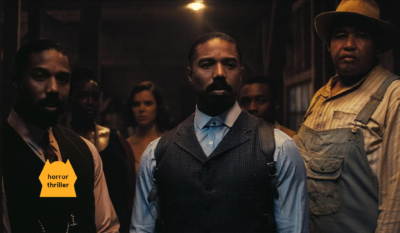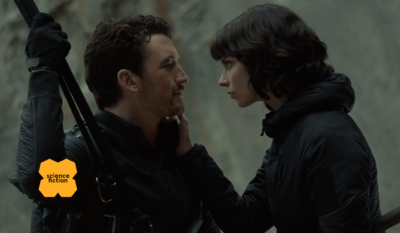In his fourth solo outing, Thor: Love and Thunder finds Thor and Valkyrie align with an unlikely new hero to take down a villain with a taste for revenge.


Thor: Love and Thunder makes up for what it lacks in structure and narrative in charming oddball energy, maximal laughs-per-minute, and a cast that is game for anything. Director Taika Waititi, returning after a very successful entry in Thor: Ragnorok, throws everything but the kitchen sink into the movie—for both better and worse. Sometimes the emotional beats are betrayed by the comedic tone and vice-versa, but when the movie gets it right—like in the riotous but stirring reveal of The Mighty Thor—it's perfection.
![]()

Thor: Love and Thunder might be more of a Taika Waititi movie than it is a Marvel Cinematic Universe movie. I mean, it's colorful, gay, and has a running gag about screaming goats—it doesn't get much more Waititi than that.
While the most recent movies in Phase Four of the Marvel Cinematic Universe have to do much heavy-lifting in setting up the rest of the series, Thor: Love and Thunder stands on its own—even with the cameos.
After all, the last time we saw Thor (Chris Hemsworth) was in Avengers: Endgame where he became one of the few main superhero holdovers from the original Avengers. Much time has passed and there is much to catch up on, which we see in a sleek and often-hilarious montage narrated by fan-favorite Korg (voiced by Waititi). Korg explains that Thor has been galavanting across the universe with the Guardians of the Galaxy “helping” various worlds with their problems. What the catch-up is meant to explain (other than how Thor dropped all his Endgame weight) is how Thor has become a bit more of a bohemian narcissist as he's searched for meaning after helping defeat Thanos.
ADVERTISEMENT
Another thing Phase Four has had in common is the use of cameos to draw audiences in (I'm looking at your Spider-Man: No Way Home). And while the move can sometimes come off as cumbersome pandering, the Guardians' (Chris Pratt, Pom Klementieff, Karen Gillan, Vin Diesel, Bradley Cooper, Sean Gunn, Dave Bautista) appearance feels slight enough to not detract from the movie. Were they completely necessary? Probably not. But they were a welcome sight.
Eventually, following a distress message from Sif (Jamie Alexander reprising her role), Thor learns that Gorr the God Butcher (Christian Bale under heavy makeup) has been going from planet to planet murdering Gods. In the movie's cold open, we see Gorr lose his daughter after he's slighted by the God he worshipped spurring his journey of revenge. More importantly, Sif reveals that New Asgaard is next.
The Sif scene is the perfect example of Waititi maintaining his comedic tone while still delivering on narrative. Sif asks Thor to let her die following a battle with Gorr so that she can go to Valhalla. An apologetic Thor informs her that she actually needs to die in the battle to go to Valhalla, but quips in the movie's funniest one-liner that maybe her missing arm made it to Valhalla.
Thor rushes back to the settlement of Asgardians where leader King Valkyrie (Tessa Thompson) is battling with the shadow creatures sent by Gorr. In yet another scene of Waititi's ingenuity, we are treated to an epic battle, introduced to The Mighty Thor, and see a hilarious montage of how Thor and his one true love Jane Foster's (Natalie Portman) relationship crumbled under the weight of both of their duties—Thor's to the Avengers and Jane's to her research.
We learn that Jane, who is suffering from cancer, was called to Thor's destroyed hammer Mjölnir. When she got to the hammer, it repaired and gifted itself to Jane in an attempt to save her. Now, as The Mighty Thor, she vows to help Thor and Valkyrie defeat Gorr who kidnaps New Asgard's children to a mysterious land called the shadow realm.
ADVERTISEMENT
Thor and Jane's relationship acts as the emotional anchor for the movie through all its absurdness. However, as often as the tonal balance between humor, thrills, and drama works—it doesn't.
The journey to the shadow realm takes our heroic quartet to Omnipotence City, a haven for the gods, where they hope to drum up support in their battle against Gorr. Specifically, they want to get the help of Zeus (Russell Crowe in a hilarious extended cameo). Unfortunately, Zeus is more interested in showing off with his lightning bolt for the other gods and, oh yeah, the orgy scheduled for later in the day.
The riortous scene is comedy gold (pun intended) where we get to see just how far Marvel is willing to let Waititi go (we go as far as seeing Chris Hemsworth's golden buns). We're also treated to Valkyrie queering it up—and bopping to Mary J. Blige's “Family Affair”—a gold-splashed action scene, and, of course, screaming goats. It's a highlight scene.
On the action side, a battle in the “shadow realm” is presented almost completely in black-and-white in one of the most thrilling creative decisions I've seen in a Marvel in quite some time. The scene is almost pure horror, but because of the tone up until that point it's difficult to feel the stakes. While Bale is completely committed to the role of Gorr—and is often terrifying—you never truly feel he's dangerous.
That's why when the movie works best when it focuses on just the characters.
With Tessa Thompson's Valkyrie, a history lesson on Korg's people, and Chris Hemsworth's peach, Love and Thunder is easily the queerest MCU movie yet.
Still, it was a low bar. In the first three phases of the MCU, it seemed that LGBTQ+ people did not exist despite romance and sexuality being front and center. I mean, one of the first few scenes of Iron Man was Tony Stark sleeping with a female reporter. Queer representation in the MCU has only now started to settle in with characters like Phastos in Eternals and now Thompson's Valkyrie and Waititi Korg in the Thor franchise wearing their queerness unapologetically. The result? A more colorful movie, both literally and figuratively.
ADVERTISEMENT
The dimension that it adds to a character like Valkyrie helps elevate the movie to a more profound plane in the same way that Thor and Jane's past gives us an emotional investment in their narrative. Instead of being heroes of perfection, they themselves have trauma that drives them forward—or hold them back. Waititi's grasp of tone and narrative in those scenes is perfection—much like his underrated gem Hunt for the Wilderpeople. It's when he has to dig back into the MCU formula that the movie loses its color.
It's clear that the best way for the MCU to move forward is to give its directors full creative control over their movies from screenplay to direction.
Much of Thor: Love and Thunder feels like MCU mastermind Kevin Feige handing Taika Waititi a blank check and a script and saying, “go,” much like Doctor Strange in the Multiverse of Madness felt like it had Sam Raimi's DNA in it. However, these two movies in addition to Chloé Zhao's Eternals show that unless Marvel truly allows these directors to completely run away with their movies—story and all—it's difficult to meld the two visions. Of those three movies, I think Love and Thunder might be the least successful because Waititi had the more difficult balancing act. He was making a comedy. All the while, Disney needed him to deliver a popcorn blockbuster and Marvel needed him to deliver on storylines familiar to comic readers. He mostly succeeds. It's clunky, the pacing is off, but I can't deny that I laughed nearly every second of screentime.
ADVERTISEMENT
More movies, less problems
- ‘Sinners' is the best movie of the year | movie review
- Romantic sci-fi thriller ‘The Gorge' hits its mark | movie reivew
- A Love Note to Fire of Love
Hey! I'm Karl. You can find me on Twitter and Letterboxd. I'm also a Tomatometer-approved critic.
💌 Sign up for our weekly email newsletter with movie recommendations available to stream.
ADVERTISEMENT
Hey, I'm Karl, founder and film critic at Smash Cut. I started Smash Cut in 2014 to share my love of movies and give a perspective I haven't yet seen represented. I'm also an editor at The New York Times, a Rotten Tomatoes-approved critic, and a member of the Online Film Critics Society.



